|
|
|
Sort Order |
|
|
|
Items / Page
|
|
|
|
|
|
|
| Srl | Item |
| 1 |
ID:
091433
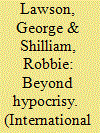

|
|
|
|
|
| Publication |
2009.
|
| Summary/Abstract |
It is no exaggeration to say that sovereignty is the foundation both of International Relations (IR) as a field of enquiry and of international politics as an 'actual existing' field of practice. Whether seen as the archetypal IR101 topic or in debates about the rights and wrongs of humanitarian intervention, the capacity of international organisations to exert control over significant spheres of international politics, or in discussions about the legitimacy of bodies such as the International Criminal Court, sovereignty appears as the central referent point of international politics. Over recent years, however, there has been considerable debate over both the substantive content ('fact') and normative framing ('value') of sovereignty. The former comes about as a result of a series of political, economic and security challenges which see states as assuming a role as 'one-amongst-many' in an increasingly complex international topography; the latter stems from concerns about whether national states form the optimal site for the articulation of authority claims. This forum engages with both of these debates, focusing on how they relate to understandings of the emergence, development and possible emasculation of sovereignty in the contemporary world. In the introduction to the forum, we outline the ways in which scholars have contested the emergence of the sovereign state and examine the ethical issues surrounding the normative value of this form of rule. In the process, we lay out the ways in which the papers that make up this forum make uncomfortable, if important, contributions to the debate about the fact and value - or 'is' and 'ought' - of sovereignty in contemporary world politics.
|
|
|
|
|
|
|
|
|
|
|
|
|
|
|
|
| 2 |
ID:
091436
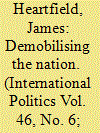

|
|
|
|
|
| Publication |
2009.
|
| Summary/Abstract |
Sovereignty is the subject of considerable debate in both International Relations (IR) theory and European Union (EU) studies. In IR, debate is oriented around the extent to which sovereignty constitutes the building block - or generative grammar - of international order. In EU studies, inter-governmentalists and integrationalists differ over how, why and to what extent European states are pooling or derogating sovereignty to supra-national institutions. This article makes no claim to resolving these debates. Rather, it works within them in order to examine the ways in which the exercise of sovereignty is becoming increasingly problematic, particularly in Western Europe. Specifically, it is argued, because of the failure of domestic political processes, European states are frustrated in terms of their international actions. This diminution of sovereignty provides the integration process with a veneer of dynamism as European institutions fill the vacuum left by demobilising nation-states.
|
|
|
|
|
|
|
|
|
|
|
|
|
|
|
|
| 3 |
ID:
091435
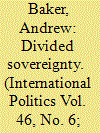

|
|
|
|
|
| Publication |
2009.
|
| Summary/Abstract |
Great Britain is regarded as a classic example of the Weberian state, and thus as a model of a developed state that might be contrasted with developing states. However, this view conceals the formative role of empire in the evolution of the British state. Rather than take the distinction between a 'metropolis' and a 'periphery' as given, this article explores the mutual constitution of state and empire. What it finds is that the political identity of the British state changed dramatically during the first half of the twentieth century as British intellectuals and policy-makers attempted to develop a new political community, primarily through the vehicle of the Commonwealth. The British state of the interwar years decentralised its decision making and embedded itself firmly in new multilateral networks. A rationalised, centralised British state emerged after the Second World War and only then within a context of multiple (principally Atlantic and European) political identities. The modern British state is as much a post-colonial invention as are states of the 'developing' world.
|
|
|
|
|
|
|
|
|
|
|
|
|
|
|
|
| 4 |
ID:
091437
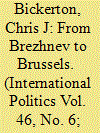

|
|
|
|
|
| Publication |
2009.
|
| Summary/Abstract |
The year 1989 is widely fêted as a turning point in the history of Eastern Europe: nation-states were liberated from the tyranny of Soviet rule and regained their sovereign independence. This article challenges the conventional wisdom by arguing that the 'limited sovereignty' of the pre-1989 period, formally declared by Leonid Brezhnev in 1968, has been replaced by a new form of domination, this time from Brussels. However, while Eastern European states still face constraints on their political autonomy and self-government, the nature of this domination is different. Specifically, it coincides with the post-Cold War revision of the concept of sovereignty itself, where the attachment to the formal rights of sovereign independence and equality is lost. Eastern European states have found that continued limitations upon their sovereignty are today celebrated as the realization of the essence of sovereignty itself.
|
|
|
|
|
|
|
|
|
|
|
|
|
|
|
|
| 5 |
ID:
091434
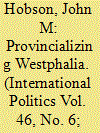

|
|
|
|
|
| Publication |
2009.
|
| Summary/Abstract |
This article critiques the 'Westphilian narrative' of the sovereign state. The dominant Eurocentric account assumes that the sovereign state emerged through a series of developments that unfolded endogenously within Europe, none of which were influenced or shaped by impulses that emanated from the East or from the non-Western world. Having outlined the various Eurocentric theories of the rise of the sovereign state, the bulk of the article forwards a non-Eurocentric alternative narrative. While accepting that there were multicausal economic, discursive, political and military foundations to sovereignty, I argue that each of these was significantly enabled by Eastern influences, in the absence of which the sovereign state might not have made an appearance within Europe. In the process, I suggest that the rise of the sovereign state occurred during the era of, and through the impact of, 'Oriental globalization', thereby recasting the relationship between sovereignty and globalization more generally
|
|
|
|
|
|
|
|
|
|
|
|
|
|
|
|
|
|
|
|
|